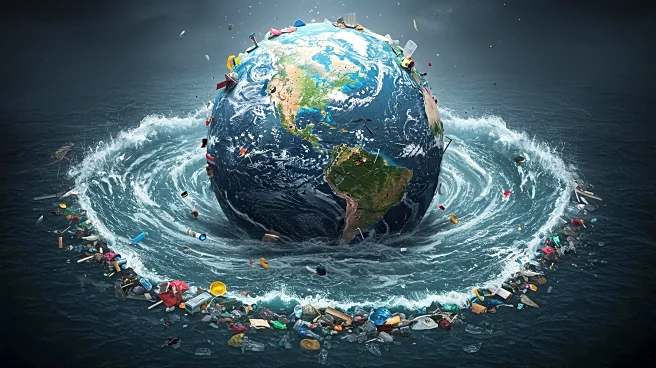What's Happening?
Negotiations aimed at establishing a global treaty to combat plastic pollution concluded without agreement in Geneva. Delegates from 184 countries were unable to reach consensus on whether to impose caps on plastic production or focus on recycling and reuse. The talks, which lasted 11 days, were influenced by opposition from oil-producing countries, including the United States and Saudi Arabia, who resisted limits on plastic production. Environmentalists and Indigenous leaders advocated for a treaty recognizing their rights and knowledge, but the final decision underscored the influence of countries opposing production limits.
Why It's Important?
The failure to reach a treaty on plastic pollution has significant implications for global environmental policy. Without a binding agreement, the production of plastics, which is projected to increase by 70% by 2040, remains unchecked. This could exacerbate environmental issues, including ocean pollution and landfill overflow. The deadlock highlights the geopolitical influence of oil-producing nations and their economic interests in maintaining high levels of plastic production. The lack of consensus also reflects broader challenges in international environmental negotiations, where economic interests often clash with ecological imperatives.
What's Next?
Delegates have agreed to reconvene for future negotiations, although no specific timeline has been set. The ongoing discussions will likely continue to face challenges from countries with vested interests in plastic production. Environmental groups and some nations may push for changes in the negotiation process to allow decisions by vote rather than consensus, potentially altering the dynamics of future talks. The outcome of these negotiations could shape global environmental policy and influence national strategies on plastic waste management.
Beyond the Headlines
The negotiations underscore the complex interplay between environmental policy and economic interests. The resistance from oil-producing countries highlights the economic dependency on plastic production, which is tied to fossil fuel industries. This situation raises ethical questions about prioritizing economic growth over environmental sustainability. The failure to reach an agreement also reflects the broader challenges in achieving global cooperation on environmental issues, where national interests often impede collective action.










